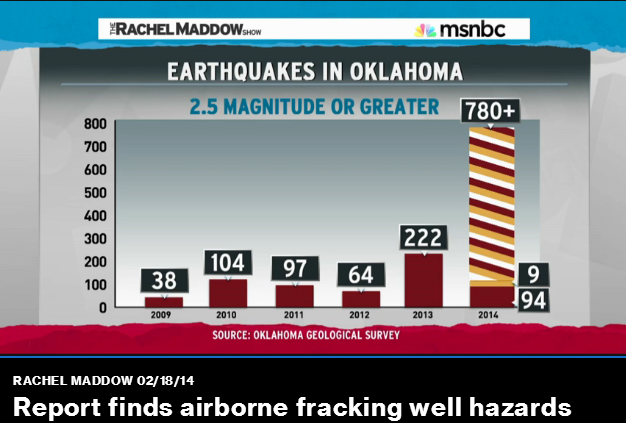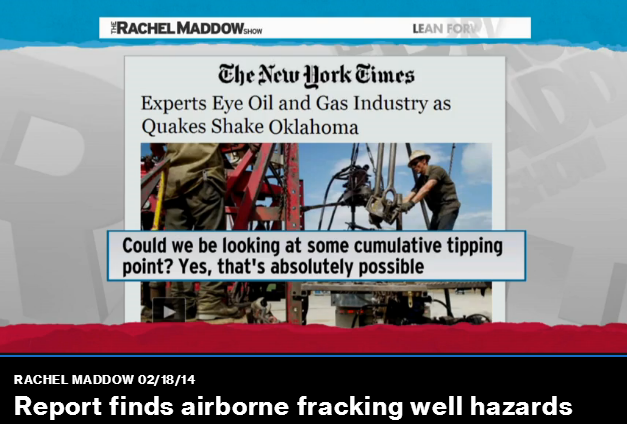Rachel Maddow Devotes Large Portion of Show to Hazards of Fracking by EcoWatch, February 19, 2014
Oklahoma Wonders Why The Earth Is Shaking, Is oil and gas drilling to blame, or is increase in earthquakes just ordinary seismic activity? by Denver Nicks, February 18, 2014, TIME
No strangers to nature’s fury, Oklahomans grow up accustomed scorching heat, blizzards, wrecking-ball thunderstorms and tornadoes. What they don’t see a lot of are earthquakes, which have been rattling the Sooner State with rare frequency of late — at least 115 earthquakes of varying intensities in the last week. “You hear a loud ‘WAM!’ and you hear this loud rattle-rattle-rattle,” said Tracey Romberger, who lives near the center of this latest swarm of earthquakes between Oklahoma City and the town of Guthrie. She described the sound as “like somebody was dropping a bomb, or a cannon going off.”
The question on everyone’s mind is: why? The area has been seismically active since time immemorial but the latest swarm of earthquakes is unheard of. According to earthquake monitors EQ Charts, between 1990 and 2008 there were between 0 and 11 earthquakes of magnitude 2.0 or greater in Oklahoma every year. In 2009 there were 49. In 2010 there were 180. In 2013 there were 291, and so far in 2014 there have been 59-plus and counting. More than a dozen notable earthquakes have shaken north-central Oklahoma in the past three days.
“It’s incredibly unusual,” said Austin Holland, a research seismologist with the Oklahoma Geologic Survey. “We’ve had swarms that are similar in nature but I don’t think we’ve had one with quite the numbers we’ve had.” State authorities are now trying to get the bottom of the unusual seismic activity. Holland is amassing resources and data to figure out what might be to blame, and the Oklahoma Corporation Commission, which oversees the oil and gas industry, has already proposed new testing and monitoring requirements for wells injected with drilling wastewater, which some have blamed for the increase in earthquakes. Hydraulic fracturing, or “fracking“, involving explosions being set off underground, has also been blamed by some for the swarm. Spent drilling water injected back into the ground for storage at high pressure, some scientists believe, may be forcing fault lines under pressure to shift. Katie Keranen, a geophysics professor at Cornell, says “the evidence is strong” that the earthquakes are caused by fracking and wastewater disposal, both of which have become more frequent amid today’s boom in oil and gas drilling.
But others scoff at the notion that fracking might be connected to seismic activity. “I work with geologists and petroleum engineers on a daily basis and they are of the opinion that [fracking] is not causing the earthquakes,” said Eric King, an attorney who works with the oil and gas industry, comparing the earthquake swarm to climate fluctuations. ”We didn’t have cold weather in Oklahoma for a lot of years but we’re having it this year,” he said.
It’s true that Oklahoma has a history of earthquake swarms that spike and then die down, but it’s also true that humans have caused earthquakes in the past. And previous swarms have been nowhere near as serious as this latest one. “We do know there have been some earthquakes caused by oil and gas activity in the state,” Holland, the research seismologist, said. “The hard part is figuring out which is which.” In the meantime, Oklahoma is steeling itself for worse quakes in the future, as each earthquake increases the likelihood that a worse earthquake will follow. That’s a prospect that could put Oklahomans on edge. “It scares you a little bit,” says Romberger. “Makes you jump.” [Emphasis added]
Red Cross offers Oklahomans free earthquake app as some geologists blame increased seismic activity on fracking wastewater disposal by Renee Lewis, February 18, Aljazeera
The Red Cross is offering a free earthquake app to Oklahomans after 150 small earthquakes hit the state in just the past week, according to the state’s geological observatory. The app gives users earthquake notifications and allows them to monitor activity where friends and family reside, Ken Garcia, a Red Cross spokesman for Central and Western Oklahoma, told Al Jazeera. “The way it works is you can set it to your current location — on mine I have it set for Oklahoma City and it has a 250-mile radius,” Garcia said. Included in the app are simple checklists to create a family emergency plan, locations of Red Cross shelters, information on what could happen after earthquakes — such as fire and tsunamis, and a toolkit with flashlight, strobe light and audible alarm.
…
Some geologists believe activities related to hydraulic fracturing, or ‘fracking’ — injecting water, sand, and a cocktail of toxic chemicals under high pressure into bedrock to increase the flow of oil or gas — could be to blame for the unusual seismic activity.
The U.S. Geological Survey (USGS) said their studies show the average number of earthquakes of magnitude 3.0 or larger annually in Oklahoma jumped from three between 1975 and 2008 to 40 from 2009 to mid-2013.
“We’ve statistically analyzed the recent earthquake rate changes and found that they do not seem to be due to typical, random fluctuations in natural seismicity rates,” Bill Leith, USGS seismologist, said
…
Since 2009 in Oklahoma, alongside earthquakes, the volume of wastewater injected into underground disposal wells had risen – up 50 percent in 2012 from the level seen during most of the 2000s. Oklahoma has more than 4,000 disposal wells for waste from the state’s tens of thousands of oil and gas wells.
…
A study by USGS found that wastewater injection increases pressure underground, which may lubricate and weaken nearby faults. If the pressure increases enough, the weakened fault will slip, causing an earthquake. But fracking, the study adds, is rarely the direct cause of such seismic activity. An Oklahoma Geological Survey statement Monday said, “The OGS has not ruled out that some earthquakes may have a relationship to oil and gas activities.”
In nearby Arkansas, a group of homeowners who filed lawsuits against well operators alleged that their properties were damaged by earthquakes that hit the region in 2010 and 2011. Scientists there blamed disposal wells for touching off more than 1,000 quakes in those years. [Emphasis added]


